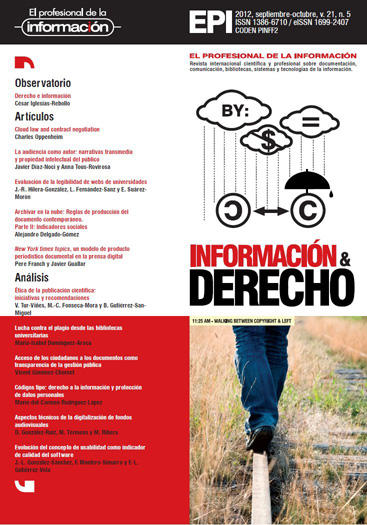Fighting against plagiarism from university libraries
DOI:
https://doi.org/10.3145/epi.2012.sep.08Keywords:
Academic plagiarism, University libraries, Information literacy, Higher education, Cyberplagiarism.Abstract
The internet has become the main source where information can be located, which has facilitated certain university student practices, plagiarism and cyber-plagiarism in particular. Academic plagiarism and related dishonest practices result in the incorporation, although unevenly, of legal, educational, and anti-plagiarism software, etc., on websites in an increasing number of Spanish university libraries. This can be a strategic decisión if considered within the framework of the new EHEA teaching methods, which require that students produce a large number of academic papers, and the growing implementation in the Spanish universities of informational skills.
Downloads
Downloads
Published
How to Cite
Issue
Section
License
Dissemination conditions of the articles once they are published
Authors can freely disseminate their articles on websites, social networks and repositories
However, the following conditions must be respected:
- Only the editorial version should be made public. Please do not publish preprints, postprints or proofs.
- Along with this copy, a specific mention of the publication in which the text has appeared must be included, also adding a clickable link to the URL: http://www.profesionaldelainformacion.com
- Only the final editorial version should be made public. Please do not publish preprints, postprints or proofs.
- Along with that copy, a specific mention of the publication in which the text has appeared must be included, also adding a clickable link to the URL: http://revista.profesionaldelainformacion.com
Profesional de la información journal offers the articles in open access with a Creative Commons BY license.




